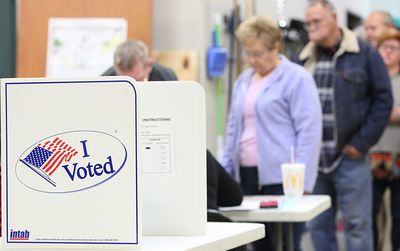Trump's Winning Coalition: Signs Of Fracture

Table of Contents
Donald Trump’s surprising victory in 2016 relied on a diverse coalition of voters. This unlikely alliance, forged through a potent blend of economic populism and cultural conservatism, propelled him to the presidency. However, recent events suggest significant fractures are appearing within this once-powerful group, raising serious questions about the Republican Party's future and the 2024 election. This article examines the key fault lines emerging within Trump's winning coalition and analyzes their potential impact on future elections.
The Erosion of Support Among Suburban Voters
Keywords: Suburban voters, Trump's base, 2020 election, Republican losses, demographics, political polarization.
The shift in suburban voting patterns from Republican to Democrat in recent elections represents a significant blow to Trump's coalition. This demographic group, once a reliable source of Republican votes, has increasingly turned away from the party, particularly since Trump's ascendance. Several factors contribute to this erosion:
- Trump's rhetoric and policies: Trump's often inflammatory rhetoric and policies on issues such as immigration and healthcare alienated many moderate suburban voters who prioritize civility and pragmatic solutions.
- Increased focus on local issues: Suburban voters are increasingly focused on local issues like education funding, property taxes, and infrastructure development. Trump's nationalistic focus often overshadowed these concerns, leading to a sense of disconnect.
- Demographic shifts: The increasing diversity of suburban communities has also played a role, with minority voters and younger generations less likely to support the Republican Party under Trump's leadership.
- Case studies: Areas like the suburbs of Philadelphia and Atlanta, traditionally Republican strongholds, saw dramatic shifts towards the Democratic Party in the 2020 election, reflecting a national trend. Analyzing these shifts provides valuable insights into the reasons behind the suburban exodus from Trump's coalition.
This loss of suburban support presents a major challenge to the Republican Party's electoral strategy, as it severely limits their ability to win crucial swing states.
Growing Tensions Between Trump's Base and Traditional Republicans
Keywords: Conservative movement, Republican establishment, Trump loyalists, intra-party conflict, political infighting.
The Republican Party is deeply divided between Trump loyalists and traditional Republicans, creating a simmering intra-party conflict that threatens to undermine the party's effectiveness. This tension manifests in several ways:
- Struggle for control: A power struggle exists between those seeking to maintain the party's traditional conservative principles and those who embrace Trump's populist approach.
- Open criticism of Trump: Prominent Republicans, including former members of the establishment, have openly criticized Trump's actions and rhetoric, further exacerbating the division.
- Impact of endorsements: Trump's endorsements in Republican primary races have often led to the victory of candidates less palatable to traditional Republicans, highlighting the party's internal struggle.
- Ideological differences: The core ideological differences between the two factions are significant, with debates over issues such as free trade, immigration, and the role of government fueling the conflict.
The long-term consequences of this internal strife are unclear, but it threatens to weaken the Republican Party’s ability to present a united front in future elections. The ongoing battle for the soul of the Republican Party will undoubtedly shape the political landscape for years to come.
The Impact of January 6th and Ongoing Investigations
Keywords: January 6th Capitol riot, Trump investigations, legal challenges, political fallout, voter trust.
The January 6th Capitol riot and the subsequent investigations into Trump's conduct have had a profound impact on his image and the overall perception of the Republican Party. The events have:
- Damaged Trump's image: The riot significantly damaged Trump's image, with many voters questioning his fitness for office and his commitment to democratic principles.
- Fueled ongoing investigations: Numerous investigations into Trump's actions surrounding the January 6th riot and other matters continue to unfold, adding to the uncertainty surrounding his future.
- Affected voter trust: These investigations and the ensuing legal challenges have eroded public trust in both Trump and the Republican Party.
- Potential legal ramifications: The potential legal consequences facing Trump could significantly alter the political landscape and further fracture his coalition.
- Public opinion polling: Polling data consistently shows a decline in Trump's approval ratings since the January 6th riot and the ongoing investigations, reflecting a growing concern among voters.
The ongoing legal and political fallout from these events is likely to continue to impact Trump’s political future and the strength of his coalition.
The Diminishing Appeal of "Populism"
Keywords: Populism, economic populism, cultural populism, voter fatigue, political messaging.
Trump's initial success was built on a potent populist message that resonated with many voters feeling left behind by the political establishment. However, the effectiveness of this appeal appears to be waning:
- Voter fatigue: Some voters may be experiencing "populism fatigue," tired of the divisive rhetoric and unsubstantiated promises.
- Shifting political landscape: The changing political climate and the emergence of new populist movements are challenging Trump's dominance within the populist arena.
- Ineffective messaging: Some argue that Trump's populist message has become less effective, failing to address the evolving concerns of his base.
- Media scrutiny: The intense media scrutiny surrounding Trump has contributed to the decline in his populist appeal, potentially affecting his ability to connect with voters.
The changing dynamics of populism and the rise of alternative populist voices suggest that Trump's core message may be losing its potency.
Conclusion
This article has explored the emerging fractures within Trump's winning coalition, highlighting the erosion of support among suburban voters, the growing tensions between Trump loyalists and traditional Republicans, and the ongoing impact of January 6th and related investigations. The diminishing appeal of populism further contributes to the instability of this once-unbreakable coalition. Understanding these significant cracks is crucial for comprehending the future trajectory of the Republican Party and the 2024 election. Further analysis of these trends is needed to fully grasp the implications of these fractures within Trump's coalition. Stay informed and continue to analyze the evolving dynamics within Trump’s base to better understand the future of the Republican party and the broader American political landscape.

Featured Posts
-
 Hidden Gems In Postman Improve Your Api Testing
May 19, 2025
Hidden Gems In Postman Improve Your Api Testing
May 19, 2025 -
 Kelowna Bear Spray Incident Victims Speak Out On Halloween Night Assault
May 19, 2025
Kelowna Bear Spray Incident Victims Speak Out On Halloween Night Assault
May 19, 2025 -
 Credit Mutuel Am Geopolitique Et Risques Environnementaux Maritimes
May 19, 2025
Credit Mutuel Am Geopolitique Et Risques Environnementaux Maritimes
May 19, 2025 -
 Mans Zelmerloew Koniec Z Eurowizja Porazka W Melodifestivalen
May 19, 2025
Mans Zelmerloew Koniec Z Eurowizja Porazka W Melodifestivalen
May 19, 2025 -
 Cardinal Notes Key Updates From Wednesday Afternoon
May 19, 2025
Cardinal Notes Key Updates From Wednesday Afternoon
May 19, 2025
